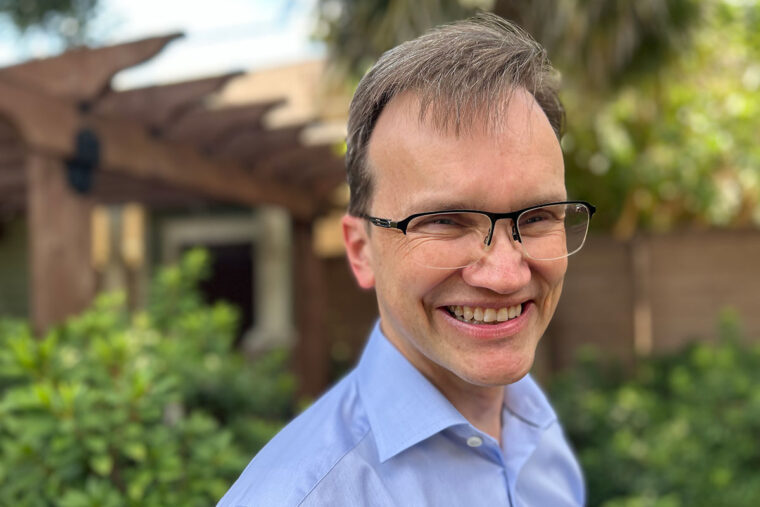
Noted developmental biologist Andy Groves has been named head of the Department of Developmental Biology at Washington University School of Medicine in St. Louis. He studies the intricate, step-by-step processes that lead to the development of the inner ear, with the goal of better understanding the ear's workings and spurring new treatments for hearing loss. Groves' appointment will begin April 7.
Groves comes to WashU Medicine from Baylor College of Medicine in Houston, where he is the Vivian L. Smith Endowed Chair in Neuroscience and a professor in the departments of Neuroscience and Molecular & Human Genetics. His appointment was announced by David H. Perlmutter, MD, executive vice chancellor for medical affairs, the George and Carol Bauer Dean of the School of Medicine, and the Spencer T. and Ann W. Olin Distinguished Professor.
"I am so pleased to announce that Andy Groves will be the next head of the Department of Developmental Biology at WashU Medicine," Perlmutter said. "Our leadership team is deeply impressed by his scientific accomplishments, vision and enthusiasm. We believe he can take the reins of a department that has made myriad significant contributions to the field of developmental biology and propel our faculty and students into the next era of this very important field, from traditional areas of organ and tissue development to aging, as well as the burgeoning fields of regeneration and reprogramming."
Groves' research, continuously funded by the National Institutes of Health (NIH) for the past 25 years, focuses on how tiny hair cells in the inner ear develop as an embryo grows, and play a critical role in hearing and balance. When damage - caused by aging, noise exposure and other influences - leads to hair cell loss, any remaining cells cannot regenerate to create new ones. For that reason, their destruction can lead to permanent hearing loss. Groves has used cell reprogramming to change the pattern of gene expression in mature hair cells, promoting the developmental processes that otherwise shut off after birth.
Groves' research to understand the molecular underpinnings of inner ear development and regeneration may help fine-tune potential gene therapy solutions for hearing loss - a condition that affects over 1.5 billion people. For his expertise in hair cell regeneration, he is often sought out by foundations and societies supporting hearing loss research. He also is a member of the Advisory Council for the National Institute on Deafness and Other Communication Disorders of the National Institutes of Health (NIH).
"I am honored to join WashU Medicine as the new head of the Department of Developmental Biology," Groves said. "I am excited by the opportunity to recruit and mentor new faculty members to this amazing institution and continue the department's 100-year record of achievement. In addition to uncovering the fascinating processes of animal development, my new colleagues in the department are making fundamental discoveries relevant to human disease, degeneration and aging. WashU has a strong culture of collaborative research, and I look forward to helping build new collaborations between our department and other departments and centers at WashU and beyond."
Groves is actively involved in mentoring the next generation of scientists. Recognized as a superb mentor, he has served on numerous graduate students' advisory committees and is the director of Baylor's Development, Disease Models & Therapeutics graduate program.
Groves earned his bachelor's degree from Cambridge University in the United Kingdom before completing his doctoral studies at the Ludwig Institute for Cancer Research in London. After postdoctoral fellowships at the California Institute of Technology in Pasadena, Calif., he started a laboratory at the House Ear Institute in Los Angeles with an academic appointment in the Department of Otolaryngology at the University of Southern California. In 2008, he joined Baylor's faculty.
Perlmutter also announced that Groves' wife, Joanna Jankowsky, will join the WashU Medicine faculty. She is a professor in Baylor's Department of Neuroscience and also holds a Vivian L. Smith Endowed Chair. Jankowsky studies how aging and genetics impact the risk of developing Alzheimer's disease. She will join WashU Medicine's Department of Neuroscience.
Groves will succeed Lila Solnica-Krezel, who has led the department since 2010. An Alan A. and Edith L. Wolff Distinguished Professor, Solnica-Krezel will continue her research at WashU Medicine, where she studies tiny, transparent zebrafish as a model system to glean insights into human health and development.
"Lila truly has been a transformational leader for the Department of Developmental Biology and the Center for Regenerative Medicine since she took the helm," Perlmutter said. "An extraordinarily dedicated scientist and a forward-thinking member of the university community, she also has made an indelible impact on positive developments at WashU Medicine through her work with colleagues on the Executive Faculty."
About Washington University School of Medicine
WashU Medicine is a global leader in academic medicine, including biomedical research, patient care and educational programs with 2,900 faculty. Its National Institutes of Health (NIH) research funding portfolio is the second largest among U.S. medical schools and has grown 56% in the last seven years. Together with institutional investment, WashU Medicine commits well over $1 billion annually to basic and clinical research innovation and training. Its faculty practice is consistently within the top five in the country, with more than 1,900 faculty physicians practicing at 130 locations and who are also the medical staffs of Barnes-Jewish and St. Louis Children's hospitals of BJC HealthCare. WashU Medicine has a storied history in MD/PhD training, recently dedicated $100 million to scholarships and curriculum renewal for its medical students, and is home to top-notch training programs in every medical subspecialty as well as physical therapy, occupational therapy, and audiology and communications sciences.
Originally published on the School of Medicine website






